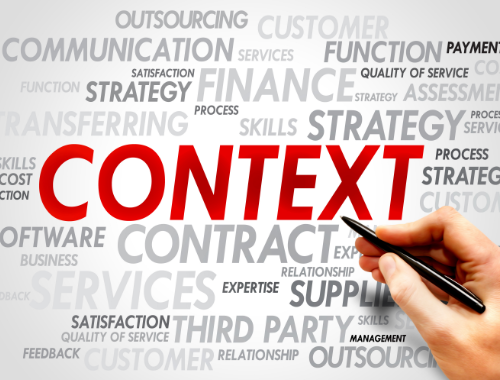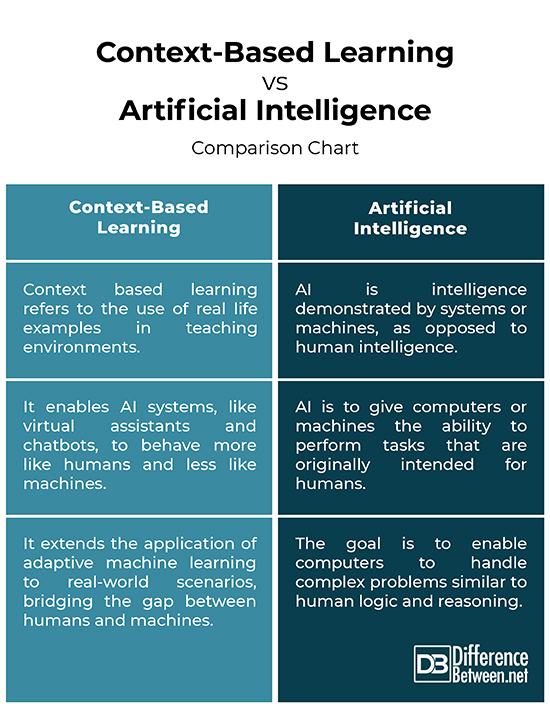Difference Between Context-Dependent Learning and Artificial Intelligence
While AI is human intelligence demonstrated in machines, contextual AI is something that takes AI to a whole new level, expanding on its applications based on a human-centric approach. Let’s take a look at both the terms in brief and try to understand the differences between them.

Context-Dependent Learning
Context-Dependent Learning or contextual learning, as opposed to what the name suggests, does not refer specifically to an algorithm or machine learning method – instead it’s a human centric approach to artificial intelligence (AI). Today, majority of businesses or organizations base their decisions largely on untapped customer data that are packed with valuable information and insights. But, within an organization, the adaption of AI becomes a challenge, at least from the users’ perspective. This is where contextual AI comes in. The idea is to allow algorithms to process information in the same way that humans do. It enables AI systems, like virtual assistants and chatbots, to behave more like humans and less like machines.

Artificial Intelligence
Artificial Intelligence (or AI) is a wide-ranging concept that relates to the simulation of human intelligence in machines. AI is intelligence demonstrated by systems or machines, as opposed to human intelligence. It’s the idea of building smart machines that are capable of solving problems and making decisions as the way humans do. The search function of Google, the Apple’s Siri, the Amazon’s Alexa, and the Netflix’s movie recommendations are all based on artificial intelligence. It’s like programming the computers to think and behave like humans, much like a computer with an artificial human brain. AI is making a computer-controlled system to think intelligently like the human mind. In today’s data-driven world, AI is everywhere, even in your smartphone as your very own virtual assistant.
Difference between Context-Dependent Learning and Artificial Intelligence
Definition
AI is the ability of a computer controlled system to perform tasks and make decisions much like how the human mind does. AI is intelligence demonstrated in machines that are programmed to think like humans and mimic their actions. Contextual AI is a human centric approach to artificial intelligence that refers to the ability to adapt and apply the skills and knowledge that has already been learned in real-life situations.
Concept
Contextual AI does not refer to a specific algorithm or machine learning technique – instead, it allows algorithms to process information in the same way that humans do. It enables AI systems, like virtual assistants and chatbots, to behave more like humans and less like machines. AI is making a computer-controlled system to think intelligently like humans. The idea is to give computers or machines the ability to perform tasks that are originally intended for humans because they require human intelligence.
Objective
Contextual AI extends the application of adaptive machine learning to real-world scenarios. It takes AI to a whole new level, building a bridge between humans and AI. A self driving car is a good example of contextual AI wherein it attempts to learn more and more of the human text. The objective of AI research is to create technology that allows computers to perform intellectual tasks such as solving problems, making decisions, understanding human actions and learning from them. The goal is to enable computers to handle complex problems similar to human logic and reasoning.
Context-Based Learning vs. Artificial Intelligence: Comparison Chart

Summary
At its most basic level, AI is a technology that enables computers or machines to learn from activities based on formerly collected data. AI is used in a variety of ways almost everywhere where human intelligence is required to tackle complex intellectual tasks, such as problem solving, decision making, and more. Contextual AI is a human centric approach to AI that puts high emphasis on context to make machines more aware of human intentions in relation to what they’ve just done and what they’re about to do. The idea is to create an environment where machines or computers can both gain and apply new skills and knowledge.
Can artificial intelligence understand context?
Machines can be programmed to understand human context and are capable of interacting with humans based on a set of input data. The context is everything when it comes to expanding the limits of AI.
What is contextual intelligence in AI?
Contextual intelligence expands the practical application of information and knowledge to real-life scenarios. Context refers to the background in which the event takes place. So, it expands on our knowledge to adapt to an entirely different environment.
What is the difference between ML model and ML algorithm?
A machine learning algorithm is the method by which the AI system gets a task done or solves a problem, while a machine learning model is a well-defined computation formed as a result of an algorithm that is being implemented in code.
What is ML modeling?
Machine learning modeling is to train a machine learning algorithm to recognize patterns or behaviors based on previous experience or formerly collected data. A ML model is basically a program that combs through mountains of data to identify patterns or make decisions.
What is contextual reasoning?
Contextual reasoning is reasoning that is fundamental to any kind of context-oriented decision making, for example, system adaptations based on user-provided or learned decision rules.
What is contextual machine learning?
Contextual machine learning does not refer to a specific machine learning method or algorithm – instead it embodies all the subtle nuances of human learning into AI. It’s the culmination of AI and machine learning that intends to learn human behavior in real time. The idea is to bring context to machine learning.
- Difference Between Caucus and Primary - June 18, 2024
- Difference Between PPO and POS - May 30, 2024
- Difference Between RFID and NFC - May 28, 2024
Search DifferenceBetween.net :
References :
[0]Papa, Rosemary and Karen Moran Jackson. Artificial Intelligence, Human Agency and the Educational Leader. Berlin, Germany: Springer, 2021. Print
[1]Papa, Rosemary and Karen Moran Jackson. Artificial Intelligence, Human Agency and the Educational Leader. Berlin, Germany: Springer, 2021. Print
[2]Garg, Vikas and Richa Goel. Handbook of Research on Innovative Management Using AI in Industry 5.0. Pennsylvania, United States: IGI Global, 2021. Print
[3]Dargie, Waltenegus. Context-Aware Computing and Self-Managing Systems. Florida, United States: CRC Press, 2009. Print
